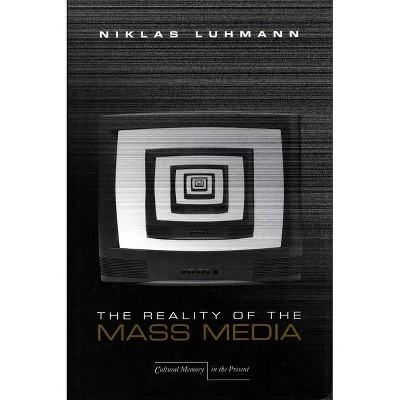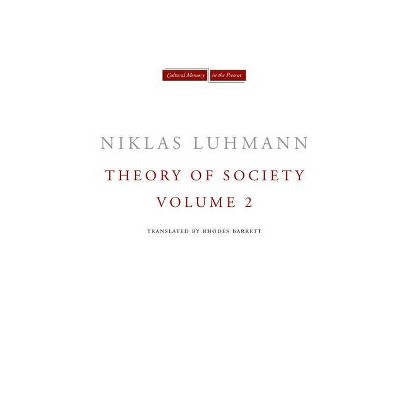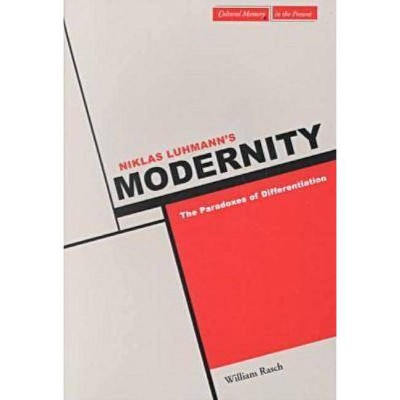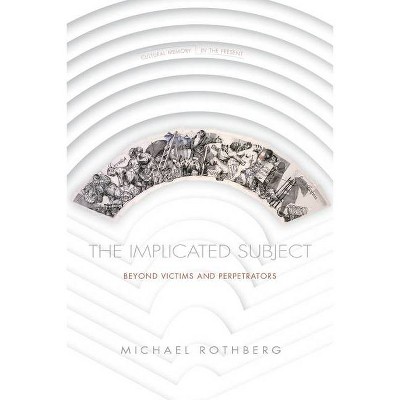The Reality of the Mass Media - (Cultural Memory in the Present) by Niklas Luhmann (Paperback)

Similar Products
Products of same category from the store
AllProduct info
<p/><br></br><p><b> About the Book </b></p></br></br>In <i>The Reality of the Mass Media</i>, Luhmann extends his theory of social systems--applied in his earlier works to the economy, the political system, art, religion, the sciences, and law--to an examination of the role of mass media in the construction of social reality.<p/><br></br><p><b> Book Synopsis </b></p></br></br><p>In <i>The Reality of the Mass Media</i>, Luhmann extends his theory of social systems--applied in his earlier works to the economy, the political system, art, religion, the sciences, and law--to an examination of the role of mass media in the construction of social reality.</p> <p>Luhmann argues that the system of mass media is a set of recursive, self-referential programs of communication, whose functions are not determined by the external values of truthfulness, objectivity, or knowledge, nor by specific social interests or political directives. Rather, he contends that the system of mass media is regulated by the internal code information/noninformation, which enables the system to select its information (news) from its own environment and to communicate this information in accordance with its own reflexive criteria.</p> <p>Despite its self-referential quality, Luhmann describes the mass media as one of the key cognitive systems of modern society, by means of which society constructs the illusion of its own reality. The reality of mass media, he argues, allows societies to process information without destabilizing social roles or overburdening social actors. It forms a broad reservoir (memory) of options for the future coordination of action, and it provides parameters for the stabilization of political reproduction of society, as it produces a continuous self-description of the world around which modern society can orient itself.</p> <p>In his discussion of mass media, Luhmann elaborates a theory of communication in which communication is seen not as the act of a particular consciousness, nor the medium of integrative social norms, but merely the technical codes through which systemic operations arrange and perpetuate themselves.</p><p/><br></br><p><b> Review Quotes </b></p></br></br><br>"In his work on social complexity, Niklas Luhmann always gave to symbolic communication a central, indeed pivotal place. Yet he had never written a systematic theoretical statement about mass media and communication. Only now, posthumously, in these "late lectures" from the very end of his extremely productive life, do we have finally such a statement. It is written with all the conceptual elegance and the supple empirical intuition that we came always to expect from this great German master, whose presence in contemporary intellectual life is already sorely missed." --Jeffrey C. Alexander, University of California, Los Angeles<br><br>"This brilliant book is of interest both as an insightful contribution to media studies theory and as a lively and readable application of Luhmann's ingenious and influential system, which neatly describes the paradoxes of media(ted)) reality." --William Outhwaite, School of European Studies, University of Sussex<br><p/><br></br><p><b> About the Author </b></p></br></br>Niklas Luhmann was Professor Emeritus of Sociology at the University of Bielefeld.
Price History
Cheapest price in the interval: 22.49 on October 22, 2021
Most expensive price in the interval: 22.49 on December 20, 2021
Price Archive shows prices from various stores, lets you see history and find the cheapest. There is no actual sale on the website. For all support, inquiry and suggestion messages communication@pricearchive.us



















